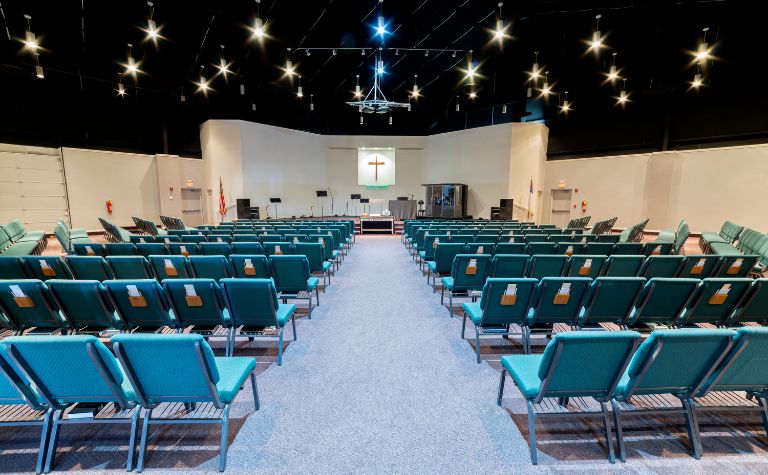Assemblies of God is a prominent denomination in Protestant Christianity. Like other Christian traditions, it values the teachings of Jesus Christ on being baptized with water. Assemblies of God agrees with some other Christian denominations about water baptism but disagrees with others.
Assemblies of God holds to so-called “believer’s baptism.” According to this conviction, only repentant, professing believers are baptized. Babies and young children aren’t professing believers, so they aren’t baptized. Assemblies of God practices full-immersion baptism, as opposed to sprinkling or pouring.
Why do Assemblies of God churches hold to believer’s baptism? What denominations agree with Assemblies of God about believer’s baptism? Which ones disagree? Is water baptism different than Spirit baptism? Keep reading to learn more.

What Is the Purpose of Water Baptism?
The purpose of water baptism is multifaceted. Churches that are convicted of baptizing infants, and those that are committed to only baptizing professing believers, have certain beliefs about baptism in common, but not all. Here are the common purposes of water baptism, as taught in the Bible:
- Union with God: Matthew 28:9, “Go therefore and make disciples of all nations, baptizing them in the name of the Father and of the Son and of the Holy Spirit.” (ESV)
- Identification with the death and resurrection of Christ: Romans 6:3-5, “We were therefore buried with Him through baptism into death, in order that, just as Christ was raised from the dead through the glory of the Father, we too may walk in newness of life.” (v. 4)
- Cleansing from sin: Acts 22:16, “And now why do you wait? Rise and be baptized and wash away your sins, calling on his name.”
- Escape from judgment: 1 Peter 3:20-21, “In the ark a few people, only eight souls, were saved through water. And this water symbolizes the baptism that now saves you also—not the removal of dirt from the body, but the pledge off a clear conscience toward God—through the resurrection of Jesus Christ.”
- Incorporation into the church: Acts 2:38-47, “Those who embraced his message were baptized, and about three thousand were added to the believers that day.” (v. 41)
Why does the Assemblies of God practice believer’s baptism? Believers’ baptism describes the conviction that only professing believers in Christ can be baptized with water.
Assemblies of God and denominations and churches in the Baptist tradition are convinced that believer’s baptism is the best understanding and application of Scripture. (Also see Assemblies of God vs. Baptist: What’s the Difference?) They make points such as:
- Christ’s instructed the church to baptize disciples, which infants aren’t: Matthew 28:19 (see above)
- The New Testament illustrates believers being baptized, not infants: e.g., Acts 8:5-12, “But when they believed Philip as he preached the gospel of the kingdom of God and the name of Jesus Christ, they were baptized, both men and women.” (v. 12)
- Certain passage link baptism to conscious faith: Gal. 3:26-27, “You are all sons of God through faith in Christ Jesus. For all of you who were baptized into Christ have clothed yourselves with Christ.” (ESV)
What denominations practice infant baptism? Protestant denominations that practice infant baptism include Lutheranism, Presbyterianism, and Methodism.
The Roman Catholic Church and the Eastern Orthodox Church practice infant baptism for different reasons. (Also see Assemblies of God vs. Methodist: What’s the Difference?)
What is the point of baptizing an infant? In Protestant traditions, baptizing infants is to include them in the covenant community and bless them. Baptizing infants is based on the Old Testament practice of circumcising male infants in part to identify them with God’s people.

Water Baptism vs. Spirit Baptism
People can easily confuse water baptism and Spirit baptism when someone just uses the word “baptism” without making a distinction between which one they mean.
Making this distinction is especially important in Assemblies of God churches because their theology and ministry emphasize baptism in the Spirit. (Also see the full article Does Assemblies of God Believe in Speaking in Tongues?)
| Water Baptism | Spirit Baptism | |
|---|---|---|
| What is the nature of the experience? | Mostly physical because a person is immersed in water, though baptism has purposes that are unseen as well, such as identification with Christ’s death and resurrection. | Mostly spiritual due to the work of the Holy Spirit, though the Assemblies of God denomination teaches that Spirit baptism has physical evidence like speaking in tongues. |
| What is the purpose of the experience? | union with God, identification with Christ’s death and resurrection, obedience to Christ (more above) | incorporation into the Church, individual edification, empowerment for ministry |
| When does it occur? | after conversion | after conversion; non-Pentecostal Christians believe baptism in the Holy Spirit occurs at the time of conversion and isn’t always evidenced by speaking in tongues |
| Is it needed for salvation? | no | no |
| What Bible verses are used to defend the practice? | Matthew 28:19, Romans 6:3-5, 1 Peter 3:20-21, Acts 2:38-47 | John 1:33, 1 Cor. 12:13, Acts 8:12-17 |
| 16 Fundamental Truths | #6: “The ordinance of baptism by immersion is commanded by the Scriptures. All who repent and believe on Christ as Savior and Lord are to be baptized. Thus they declare to the world that they have died with Christ and that they also have been raised with Him to walk in newness of life.” | #7: “All believers are entitled to and should ardently expect and earnestly seek the promise of the Father, the baptism in the Holy Spirit and fire, according to the command of our Lord Jesus Christ. This was the normal experience of all in the early Christian Church. With it comes the enduement of power for life and service, the bestowment of the gifts and their uses in the work of the ministry.” |
The reason “baptism” is used to describe both events is that (1) Scripture describes both events that way, and (2) the word implies that a person is being inundated, engulfed, or covered. In water baptism, a person is inundated with water. In Spirit baptism, they are inundated with the Holy Spirit.

Does the Assemblies of God Baptize Infants?
Assemblies of God churches don’t baptize infants. The conviction of the denomination is that only professing believers can be baptized, and young children can’t express sorrow over sin or profess belief in Christ. (Presbyterians baptize infants. See Assemblies of God vs. Presbyterians: What’s the Difference? to learn more.)
What is child dedication? Churches that don’t baptize infants often offer parents a “child dedication.” A child dedication occurs during a worship service so that the entire church family can witness it.
While no water is involved, the pastor often talks about raising children according to the Bible. The pastor then asks the child’s parents to commit verbally to do this and encourages the congregation to help them. Prayer for the child is also included.
References:
[1] Source
[2] Source
[3] Source
Related Questions
The Assemblies of God and Baptist traditions are sizable and significant branches of Protestant Christianity. They each have a fascinating history in Europe, America, and as of the twenty-first...
The Assemblies of God and the Church of God (Cleveland, Tennessee) are two of the oldest Pentecostal denominations in the world. There is a lot that unites these Protestant-Christian traditions, yet...
